北京市各区县模拟完型
- 格式:doc
- 大小:164.00 KB
- 文档页数:20
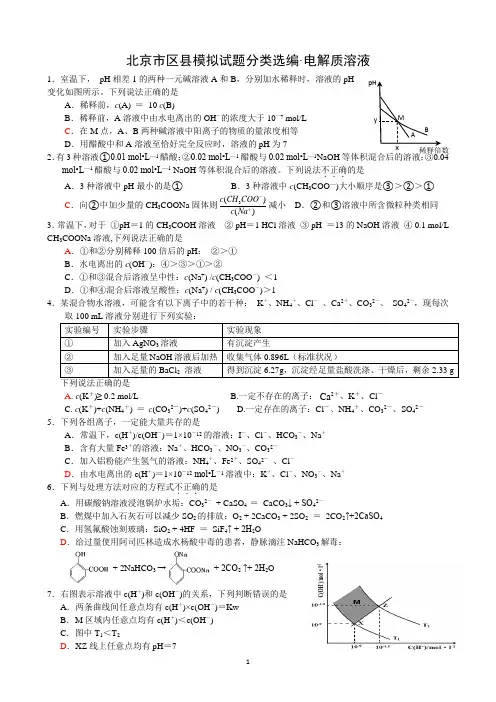
北京市区县模拟试题分类选编·电解质溶液1.室温下, pH 相差1的两种一元碱溶液A 和B ,分别加水稀释时,溶液的pH 变化如图所示。
下列说法正确的是 A .稀释前,c (A) = 10 c (B) B .稀释前,A 溶液中由水电离出的OH -的浓度大于10-7mol/L C .在M 点,A 、B 两种碱溶液中阳离子的物质的量浓度相等 D .用醋酸中和A 溶液至恰好完全反应时,溶液的pH 为7 2.有3种溶液①0.01 mol•L —1醋酸;②0.02 mol•L —1醋酸与0.02 mol•L —1NaOH 等体积混合后的溶液;③0.04mol•L —1醋酸与0.02 mol•L —1 NaOH 等体积混合后的溶液。
下列说法不正确...的是 A .3种溶液中pH 最小的是① B .3种溶液中c (CH 3COO —)大小顺序是③>②>①C .向②中加少量的CH 3COONa 固体则3()()c CH COO c Na -+减小 D .②和③溶液中所含微粒种类相同3.常温下,对于 ①pH =1的CH 3COOH 溶液 ② pH =1 HCl 溶液 ③ pH =13的NaOH 溶液 ④ 0.1 mol/L CH 3COONa 溶液,下列说法正确的是A .①和②分别稀释100倍后的pH : ②>①B .水电离出的c (OH -):④>③>①>②C .①和③混合后溶液呈中性:c (Na +) /c (CH 3COO -) <1D .①和④混合后溶液呈酸性:c (Na +) / c (CH 3COO -)>14.某混合物水溶液,可能含有以下离子中的若干种: K +、NH 4+、Cl - 、Ca 2+、CO 32-、 SO 42-,现每次取100 mL 溶液分别进行下列实验:A . c (K +)≥ 0.2 mol/L B.一定不存在的离子: Ca 2+、K +、Cl -C. c (K +)+c (NH 4+) = c (CO 32-)+c (SO 42-)D.一定存在的离子:Cl -、NH 4+、CO 32-、SO 42- 5.下列各组离子,一定能大量共存的是A .常温下,c(H +)/c(OH -)=1×10-12的溶液:I -、Cl -、HCO 3-、Na +B .含有大量Fe 3+的溶液:Na +、HCO 3-、NO 3-、CO 32-C .加入铝粉能产生氢气的溶液:NH 4+、Fe 2+、SO 42- 、Cl -D .由水电离出的c(H +)=1×10-12 mol•L -1溶液中:K +、Cl -、NO 3-、Na +6.下列与处理方法对应的方程式不正确...的是 A .用碳酸钠溶液浸泡锅炉水垢:CO 32-+ CaSO 4 = CaCO 3↓ + SO 42-B .燃煤中加入石灰石可以减少SO 2的排放:O 2 + 2CaCO 3 + 2SO 2 = 2CO 2↑+2CaSO 4C .用氢氟酸蚀刻玻璃:SiO 2 + 4HF = SiF 4↑ + 2H 2OD .给过量使用阿司匹林造成水杨酸中毒的患者,静脉滴注NaHCO 3解毒:+ 2NaHCO 3 →+ 2CO 2 ↑+ 2H 2O7.右图表示溶液中c(H +)和c(OH -)的关系,下列判断错误的是A .两条曲线间任意点均有c(H +)×c(OH -)=KwB .M 区域内任意点均有c(H +)<c(OH -) C .图中T 1<T 2D .XZ 线上任意点均有pH =7c -c (H +) mol/L10-10-8.室温下,下列混合溶液中,各离子浓度的关系正确的是A .pH =12的氨水溶液与pH =2的盐酸溶液等体积混合 c (NH 4+)>c (Cl -)>c (OH -)>c (H +)B .浓度均为0.1mol·L -1的硫酸氢铵溶液与氢氧化钠溶液等体积混合c (Na +)>c (SO 42-)>c (NH 4+)>c (H +)>c (OH -)C .浓度均为0.1mol·L -1的小苏打溶液与烧碱溶液等体积混合c (Na +)+c (H +)=2c (CO 32-)+c (OH -)D .浓度均为0.1mol·L -1的醋酸溶液与氢氧化钠溶液等体积混合 c (Na +)=c (CH 3COO -)>c (OH -)=c (H +)9.在25mL 0.1mol·L -1NaOH 溶液中逐滴加入0.2mol·L -1CH 3COOH 溶液, 溶液pH 变化曲线如图所示,下列有关离子浓度的比较正确的是A .在A 、B 间任一点(不含A 、B 点),溶液中可能有c(Na +)>c(CH 3COO -)>c(OH -)>c(H +)B .在B 点,a >12.5,且有c(Na +)=c(CH 3COO -)=c(OH -)=c(H +)C .在C 点,c(CH 3COO -)>c(Na +)>c(OH -)>c(H +)D .在D 点,c(CH 3COO -)+c(CH 3COOH)=c(Na +)10.在水的电离平衡中,c (H +)和c (OH -)的关系如下图所示: (1)A 点水的离子积为1×10-14 ,B 点水的离子积为 。
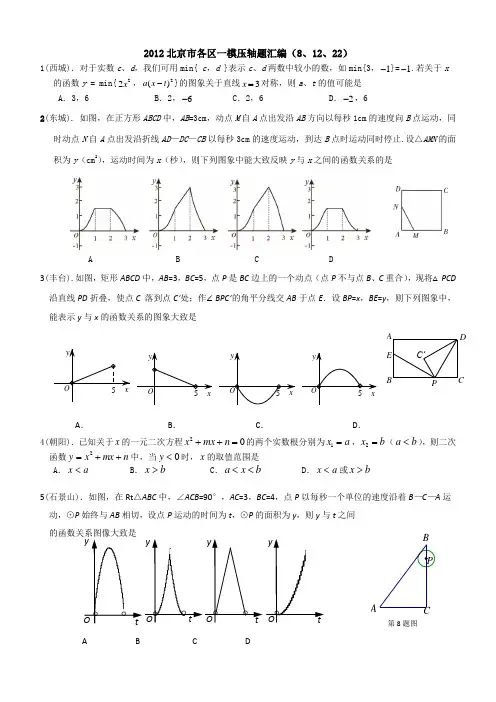
2012北京市各区一模压轴题汇编(8、12、22)1(西城).对于实数c 、d ,我们可用min{ c ,d }表示c 、d 两数中较小的数,如min{3,1-}=1-.若关于x 的函数y = min{22x ,2()a x t -}的图象关于直线3x =对称,则a 、t 的值可能是 A .3,6 B .2,6- C .2,6 D .2-,62(东城). 如图,在正方形ABCD 中,AB =3cm ,动点M 自A 点出发沿AB 方向以每秒1cm 的速度向B 点运动,同时动点N 自A 点出发沿折线AD —DC —CB 以每秒3cm 的速度运动,到达B 点时运动同时停止.设△AMN 的面积为y (cm 2),运动时间为x (秒),则下列图象中能大致反映y 与x 之间的函数关系的是A B C D3(丰台).如图,矩形ABCD 中,AB =3,BC =5,点P 是BC 边上的一个动点(点P 不与点B 、C 重合),现将△PCDD6.(海淀)7(房山).如图,梯形ABCD 中,AB ∥CD ,∠A =30°,∠B =60°,AD =32,CD =2,点P 是线段AB 上一个动点,过点P 作PQ ⊥AB 于P ,交其它边于Q ,设BP 为x ,△BPQ 的面积为y ,则下列图象中,能表示y 与x 的 ).xy 6312Oxy 6312O xy 6312O x y 6312O8(平谷).在以下四个图形中,经过折叠能围成一个正方体的是9(昌平).如图,已知□ABCD 中,AB =4,AD =2,E 是AB 边上的一动点(与点A 、B 不重合),设AE =x ,DE 的延长线交CB 的延长线于点F ,设BF =y ,则下列图象能正确反映y 与x 的函数关系的是10(怀柔) 如图,在矩形ABCD 中,AB =4,BC =6,当直角三角板MPN 的直角顶点P 在BC 边上移动时,直角边MP 始终经过点A ,设直角三角板的另一直角边PN 与CD 相交于点Q .BP =x ,CQ=y ,那么y 与x 之间的函数图象大致是FEDC BA DC B A中点S 的最短距离A.(212π+)cm B.(2412π+)cm C.(214π+)cm D.(242π+)cm12(顺义).如图,在Rt △ABC 中,90ACB ∠=︒,60A ∠=︒,AC =2,D 是AB 边上一个动点(不与点A 、B 重合),E 是BC 边上一点,且30CDE ∠=︒.设AD=x , BE=y ,则下列图象中,能表示y 与x 的函数关系的图象大致是13(通州)14(密云)在正方体的表面上画有如图⑴中所示的粗线,图⑵是其展开图的示意图,但只在A 面上画有粗线,那么将图⑴中剩余两个面中的粗线画入图⑵中,画法正确的是15(延庆)1(西城).如图,直角三角形纸片ABC 中,∠ACB =90°,AC=8,BC =6.折叠该纸片使点B 与点C 重合,折痕与AB 、BC 的交点分别 为D 、E . (1) DE 的长为 ;(2) 将折叠后的图形沿直线AE 剪开,原纸片被剪成三块,其中最小一块的面积等于 .2(东城). 如图,正方形ABCD 的边长为10,内部有6个全等的正方形,小正方形的顶点E 、F 、G 、H 分别落在边AD 、AB 、BC 、CD 上,则DE 的长为 .3(丰台).在数学校本活动课上,张老师设计了一个游戏,让电动娃娃在边长为1的正方形的四个顶点上依次跳动.规定:从顶点A 出发,每跳动一步的长均为1.第一次顺时针方向跳1步到达顶点D ,第二次逆时针方向跳2步到达顶点B ,第三次顺时针方向跳3步到达顶点C ,第四次逆时针方向跳4步到达顶点C ,… ,以此类推,跳动第10次到达的顶点是 ,跳动第2012次到达的顶点是 .4(朝阳).如图,在正方形ABCD 中,AB =1,E 、F 分别是BC 、CD 边上点,(1)若CE =12CB ,CF =12CD ,则图中阴影部分的面积是 ;(2)若CE =1n CB ,CF =1n CD ,则图中阴影部分的面积是 (用含n 的式子表示,n 是正整数).(第4题)5(石景山).一个正整数数表如下(表中下一行中数的个数是上一行中数的个数的2倍):则第4行中的最后一个数是 ,第n 行中共有 个数, 第n 行的第n 个数是 .6(海淀).12、在平面直角坐标系xOy 中,正方形O C B A 111、1222B C B A 、2333B C B A ,…,按右图所示的方式放置.点1A 、2A 、3A ,…和点1B 、2B 、3B ,…分别在直线b kx y +=和x 轴上.已知1C (1,1-),2C (27,23-),则点3A 的坐标是_______;点n A 的坐标是________. ADCB A7(房山).如图,已知Rt △ABC 中,∠ACB =90°,AC =6,BC = 8,过直角顶点C 作CA 1⊥AB ,垂足为A 1,再过A 1作A 1C 1⊥BC ,垂足为C 1,过C 1作C 1A 2⊥AB ,垂足为A 2,再过A 2作A 2C 2⊥BC ,垂足为C 2,…,这样一直作下去,得到了一组线段CA 1,A 1C 1,C 1A 2,A 2C 2,…,A n C n ,则A 1C 1= ,A n C n = .8(平谷). 小华将一条直角边长为1的一个等腰直角三角形纸片(如图1),沿它的对称轴折叠1次后得到一个等腰直角三角形(如图2),再将图2的等腰直角三角形沿它的对称轴折叠后得到一个等腰直角三角形(如图3),则图3中的等腰直角三角形的一条腰长为_____________;同上操作,若小华连续将图1的等腰直角三角形折叠n 次后所得到的等腰直角三角形(如图n+1)的一条腰长为_______________________.9(昌平).己知□ABCD 中,AD =6,点E 在直线AD 上,且DE =3,连结BE 与对角线AC 相交于点M ,则MCAM= .10(怀柔).一组按规律排列的数:2,0,4,0,6,0,…,其中第7个数是 ,第n 个数是 .(用含字母n 的代数式表示,n 为正整数).11(大兴).如图所示的10 三角数表.从上往下数,第1次全行的数都为1的是第1行,第2次全行的数都为1的是第3行,第3次全行的数都为1的是第 行,… ,第n 次全行的数都为1的是第 行.第1行 第2行第3行 第4行第5行……………………………………12(门头沟).如图,对面积为1的△ABC 逐次进行以下操作: 第一次操作,分别延长AB 、BC 、CA 至A 1、B 1、C 1, 使得A 1B =2AB ,B 1C =2BC ,C 1A =2CA ,顺次连接A 1、 B 1、C 1,得到△A 1B 1C 1,记其面积为S 1;第二次操作, 分别延长A 1B 1,B 1C 1,C 1A 1至A 2,B 2,C 2,使得 A 2B 1=2A 1B 1,B 2C 1=2B 1C 1,C 2A 1=2C 1A 1,顺次连接 A 2,B 2,C 2,得到△A 2B 2C 2,记其面积为S 2……, 按此规律继续下去,可得到△A 5B 5C 5,则其面积为 S 5=_________. 第n 次操作得到△A n B n C n , 则△A n B n C n 的面积S n = .ABCA 1A 2A 3 A 4A 5 C 1 23 4 5 12题图第7题图13(顺义).如图,菱形ABCD 中,AB =2 ,∠C =60°,我们把菱形ABCD 的对称中心称作菱形的中心.菱形ABCD在直线l 上向右作无滑动的翻滚,每绕着一个顶点旋转60°叫一次操作,则经过1次这样的操作菱形中心O 所经过的路径长为 ;经过18次这样的操作菱形中心O 所经过的路径总长为 ;经过3n (n 为正整数)次这样的操作菱形中心O 所经过的路径总长为 .(结果都保留π)14(通州)12.已知如图,△ABC 和△DCE 都是等边三角形,若△ABC 的边长为1,则△BAE 的面积是 .四边形ABCD 和四边形BEFG 都是正方形,若正方形ABCD 的边长为4,则△F AC 的面积是 . ……如果两个正多边形ABCDE …和BPKGY …是正n (n ≥3)边形,正多边形ABCDE …的边长是2a ,则△KCA 的面积是 .(结果用含有a 、n 的代数式表示)15(密云)在∠A (0°<∠A <90°)的内部画线段,并使线段的两端点分别落在角的两边AB 、AC 上,如图所示,从点A 1开始,依次向右画线段,使线段与线段在两端点处互相垂直,A 1A 2为第1条线段.设AA 1=A 1A 2=A 2A 3=1,则∠A =;若记线段A 2n-1A 2n 的长度为a n (n 为正整数),如A 1A 2=a 1,A 3A 4=a 2,则此时a 2= ,a n = (用含n 的式子表示).16(延庆)12.将1、2、3、6按右侧方式排列.若规定(m,n )表示第m排从左向右第n 个数,则(7,3)所表示的数是 ;(5,2)与(20,17)表示的两数之积是E 111122663263323第1排第2排第3排第4排第5排1.(西城). 阅读下列材料:问题:如图1,在正方形ABCD 内有一点P ,PA =5,PB =2,PC =1,求∠BPC 的度数.小明同学的想法是:已知条件比较分散,可以通过旋转变换将分散的已知条件集中在一起,于是他将△BPC 绕点B 逆时针旋转90°,得到了△BP ′A (如图2),然后连结PP ′. 请你参考小明同学的思路,解决下列问题: (1) 图2中∠BPC 的度数为 ;(2) 如图3,若在正六边形ABCDEF 内有一点P ,且P A =132,PB =4,PC =2,则∠BPC 的度数为 ,正六边形ABCDEF 的边长为 .图1 图2 图32.(东城)在ABC △中,AB 、BC 、AC 这道题时,先建立一个正方形网格(每个小正方形的边长为1),再在网格中画出格点ABC △(即ABC △三个顶点都在小正方形的顶点处),如图1所示.这样不需求ABC △的高,而借用网格就能计算出它的面积. (1)请你将ABC △的面积直接填写在横线上__________________; 思维拓展:(2)我们把上述求ABC △面积的方法叫做构图法....若ABC △(0a >),请利用图2的正方形网格(每个小正方形的边长为a )画出相应的ABC △,并求出它的面积填写在横线上__________________; 探索创新:(3)若ABC △(0a >),且ABC △的面积为22a ,试运用构图法...在图3的正方形网格(每个小正方形的边长为a )中画出所有符合题意的ABC △(全等的三角形视为同一种情况),并求出它的第三条边长填写在横线上__________________.CB A D3(丰台).将矩形纸片分别沿两条不同的直线剪两刀,可以使剪得的三块纸片恰能拼成一个等腰三角形(不能有重叠和缝隙).小明的做法是:如图1所示,在矩形ABCD 中,分别取AD 、AB 、CD 的中点P 、E 、F ,并沿直线PE 、PF 剪两刀,所得的三部分可拼成等腰三角形△PMN (如图2).(1)在图3中画出另一种剪拼成等腰三角形的示意图;(2)以矩形ABCD 的顶点B 为原点,BC 所在直线为x 轴建立平面直角坐标系(如图4),矩形ABCD 剪拼后得到等腰三角形△PMN ,点P 在边AD 上(不与点A 、D 重合),点M 、N 在x 轴上(点M 在N 的左边).如果点D 的坐标为(5,8),直线PM 的解析式为=y kx b +,则所有满足条件的k 的值为 .图1 图2图 3图4 备用4(朝阳)根据对北京市相关的市场物价调研,预计进入夏季后的某一段时间,某批发市场内的甲种蔬菜的销售利润y 1(千元)与进货量x (吨)之间的函数kx y =1的图象如图①所示,乙种蔬菜的销售利润y 2(千元)与进货量x (吨)之间的函数bx ax y +=22的图象如图②所示.(1)分别求出y 1、y 2与x 之间的函数关系式;(2)如果该市场准备进甲、乙两种蔬菜共10吨,设乙种蔬菜的进货量为t 吨,写出这两种蔬菜所获得的销售利润之和W (千元)与t (吨)之间的函数关系式,并求出这两种蔬菜各进多少吨时获得的销售利润之和最大,最大利润是多少?图① 图②P E FDA B C PE F D ABCy (万元)(吨)Oy (千元)5(石景山)生活中,有人用纸条可以折成正五边形的形状,折叠过程是将图①中的纸条按图②方式拉紧,压平后可得到图③中的正五边形(阴影部分表示纸条的反面).(1)将,若将展开,展开后的平面图形是 ;(2)若原长方形纸条(图①)宽为2cm ,求(1)中展开后平面图形的周长(可以用三角函数表示). 6(海淀)22、阅读下面材料:小明遇到这样一个问题:如图1:△ABO 和△CDO 均为等腰直角三角形,∠A OB =∠COD=90°.若△BOC 的面积为1,试求以AD 、BC 、OC+OD 的长度为三边长的三角形的面积.小明是这样思考的:要解决这个问题,首先应想办法移动这些分散的线段,构造一个三角形,再计算其面积即可.他利用图形变换解决了这个问题,其解题思路是延长CO 到E ,使得OE =CO ,连接BE ,可证△OBE ≌△OAD ,从而得到的△OBE 即是以AD 、BC 、OC+OD 的长度为三边长的三角形(如图2). 请你回答:图2中△OBE 的面积等于___________.请你尝试用平移、旋转、翻折的方法,解决下列问题:如图3,已知△ABC ,分别以AB 、AC 、BC 为边向外作正方形ABDE 、AGFC 、BCHI ,连接EG 、FH 、ID .(1)在图3中利用图形变换画出并指明以EG 、FH 、ID 的长度为三边长的一个三角形(保留作图痕迹);(2)若△ABC 的面积为1,则以EG 、FH 、ID 的长度为三边长的三角形的面积等于__________. 图① 图② 图③图1图2图37(房山).阅读下面材料:如图1,已知线段AB、CD相交于点O,且AB=CD,请你利用所学知识把线段AB、CD转移到同一三角形中.小强同学利用平移知识解决了此问题,具体做法:如图2,延长OD至点E,使DE=CO,延长OA至点F,使AF=OB,联结EF,则△OEF为所求的三角形.请你仔细体会小强的做法,探究并解答下列问题:如图3,长为2的三条线段AA′,BB′,CC′交于一点O,并且∠B′OA=∠C′OB=∠A′OC=60°;(1)请你把三条线段AA′,BB′,CC′转移到同一三角形中.(简要叙述画法)(2)联结AB′、BC′、CA′,如图4,设△AB′O、△BC′O、△CA′O的面积分别为S1、S2、S3,则S1+S2+S(填“>”或“<”或“=”).8(平谷).ABC△和点S在平面直角坐标系中的位置如图所示:(1)将ABC△向右平移4个单位得到111A B C△,则点1A的坐标是( ),点1B的坐标是( ) ;(2)将ABC△绕点S按顺时针方向旋转90 ,画出旋转后的图形.9(昌平).问题探究:(1)如图1,在边长为3的正方形ABCD内(含边)画出使∠BPC=90°的一个点P,保留作图痕迹;(2)如图2,在边长为3的正方形ABCD内(含边)画出使∠BPC=60°的所有的点P,保留作图痕迹并简要说明作法;(3)如图3,已知矩形ABCD,AB=3,BC=4,在矩形ABCD内(含边)画出使∠BPC=60°,且使△BPC的面积最大的所有点P,保留作图痕迹.图2图3图3图2图1A DCBAB CDDCBAB10(怀柔). 如图①,将一张直角三角形纸片ABC ∆折叠,使点A 与点C 重合,这时DE 为折痕,CBE ∆为等腰三角形;再继续将纸片沿CBE ∆的对称轴EF 折叠,这时得到了两个完全重合的矩形(其中一个是原直角三角形的内接矩形,另一个是拼合成的无缝隙、无重叠的矩形),我们称这样两个矩形为“叠加矩形”.图① 图② 图③ (1)如图②,在正方形网格中,能否仿照前面的方法把ABC ∆折叠成“叠加矩形”,如果能,请在图②中画出折痕及叠加矩形;(2)如图③,在正方形网格中,以给定的BC 为一边,画出一个斜ABC ∆,使其顶点A 在格点上,且ABC ∆折成的“叠加矩形”为正方形;(3)如果一个三角形所折成的“叠加矩形”为正方形,那么它必须满足的条件是什么?11(大兴).阅读下列材料:小明遇到一个问题:已知:如图1,在△ABC 中,∠BAC=120°,∠ABC=40°,试过△ABC 的一个顶点画一条直线,将此三角形分割成两个等腰三角形.他的做法是:如图2,首先保留最小角∠C ,然后过三角形顶点A 画直线交BC 于点D. 将∠BAC 分成两个角,使∠DAC=20°,△ABC 即可被分割成两个等腰三角形.喜欢动脑筋的小明又继续探究:当三角形内角中的两个角满足怎样的数量关系时,此三角形一定可以被过顶点的一条直线分割成两个等腰三角形.他的做法是:如图3,先画△ADC ,使DA=DC ,延长AD 到点B ,使△BCD 也是等腰三角形,如果DC=BC ,那么∠CDB =∠ABC ,因为∠CDB=2∠A ,所以∠ABC= 2∠A .于是小明得到了一个结论:当三角形中有一个角是最小角的2倍时,则此三角形一定可以被过顶点的一条直线分割成两个等腰三角形.请你参考小明的做法继续探究:当三角形内角中的两个角满足怎样的数量关系时,此三角形一定可以被过顶点的一条直线分割成两个等腰三角形.请直接写出你所探究出的另外两条结论(不必写出探究过程或理由).12(门头沟).阅读下面材料:小伟遇到这样一个问题:如图1,在正方形ABCD 中,点E 、F 分别为DC 、BC 边上的点,∠EAF =45°,连结EF ,求证:DE +BF =EF .小伟是这样思考的:要想解决这个问题,首先应想办法将这些分散的线段集中到同一条线段上.他先后尝试了平移、翻折、旋转的方法,发现通过旋转可以解决此问题.他的方法是将△ADE 绕点A 顺时针旋转90°得到△ABG (如图2),此时GF 即是DE +BF .请回答:在图2中,∠GAF 的度数是 .参考小伟得到的结论和思考问题的方法,解决下列问题:(1)如图3,在直角梯形ABCD 中,AD ∥BC (AD >BC ), ∠D =90°,AD =CD =10,E 是CD 上一点,若∠BAE =45°, DE =4,则BE = .(2)如图4,在平面直角坐标系xOy 中,点B 是x 轴上一动点,且点A (3-,2),连结AB 和AO ,并以AB 为边向上作 正方形ABCD ,若C (x ,y ),试用含x 的代数式表示y , 则y = .13(顺义).问题背景(1)如图1,△ABC 中,DE ∥BC 分别交AB ,AC 于D ,E 两点,过点D 作DF ∥AC 交BC 于点F .请按图示数据填空:四边形DFCE 的面积S = , △DBF 的面积1S = , △ADE 的面积2S = .探究发现(2)在(1)中,若BF a =,FC b =,D G与BC 间的距离为h .直接写出2S = (用含S 、1S 的代数式表示).拓展迁移(3)如图2,□DEFG 的四个顶点在△ABC 的三边上,若△ADG 、△DBE 、△GFC 的面积分别为4、8、1,试利用..(2.)中的结论....求□DEFG 的面积,直接写出结果.D F ED ABC B EDAG F EAB C C图1图2图3CDAOB x y 图4图FE D A BCB EDA GF E D A BCC图1图23CD AO Bxy图414(通州)22.小明在学习轴对称的时候,老师留了这样一道思考题:如图,已知在直线l的同侧有A 、B 两点,请你在直线l 上确定一点P ,使得P A+PB 的值最小.小明通过独立思考,很快得出了解决这个问题的正确方法,他的作法是这样的: ①作点A 关于直线l 的对称点A′. ②连结A′B ,交直线l 于点P . 则点P 为所求.请你参考小明的作法解决下列问题:(1)如图1,在△ABC 中,点D 、E 分别是AB 、AC 边的中点,BC =6,BC边上的高为4,请你在BC 边上确定一点P ,使得△PDE 的周长最小. ①在图1中作出点P .(三角板、刻度尺作图,保留作图 痕迹,不写作法) ②请直接写出△PDE 周长的最小值 .(2)如图2在矩形ABCD 中,AB =4,BC =6,G 为边AD 的中点,若E 、F 为边AB 上的两个动点,点E 在点F 左侧,且EF =1,当四边形CGEF 的周长最小时,请你在图2中确定点E 、F 的位置.(三角板、刻度尺作图,保留作图痕迹,不写作法),并直接写出四边形CGEF 周长的最小值 .15(密云)如图①,将一张直角三角形纸片ABC 折叠,使点A 与点C 重合,这时DE 为折痕, △CBE 为等腰三角形;再继续将纸片沿△CBE 的对称轴EF 折叠,这时得到了两个 完全重合的矩形(其中一个是原直角三角形的内接矩形,另一个是拼合成的无缝隙、 无重叠的矩形),我们称这样两个矩形为“叠加矩形”.请完成下列问题: (1)如图②,正方形网格中的△ABC 能折叠成“叠加矩形”吗?如果能,请在图②中画出折痕;(2)如图③,在正方形网格中,以给定的BC 为一边,画出一个斜△ABC ,使其顶点A 在格点上,且△ABC 折成的“叠加矩形”为正方形;(3)如果一个三角形所折成的“叠加矩形”为正方形,那么他必须满足的条件是 .l AB图1图1图1图2图316.延庆22. (本题满分4分)阅读下面材料:小红遇到这样一个问题,如图1:在△ABC 中,A D ⊥BC ,BD=4,DC=6,且∠BAC=45°,求线段AD 的长.小红是这样想的:作△ABC 的外接圆⊙O ,如图2:利用同弧所对圆周角和圆心角的关系,可以知道∠BOC=90°,然后过O 点作OE ⊥BC 于E ,作OF ⊥AD 于F ,在Rt △BOC 中可以求出⊙O 半径及 O E ,在Rt △AOF 中可以求出AF,最后利用AD=AF+DF 得以解决此题。
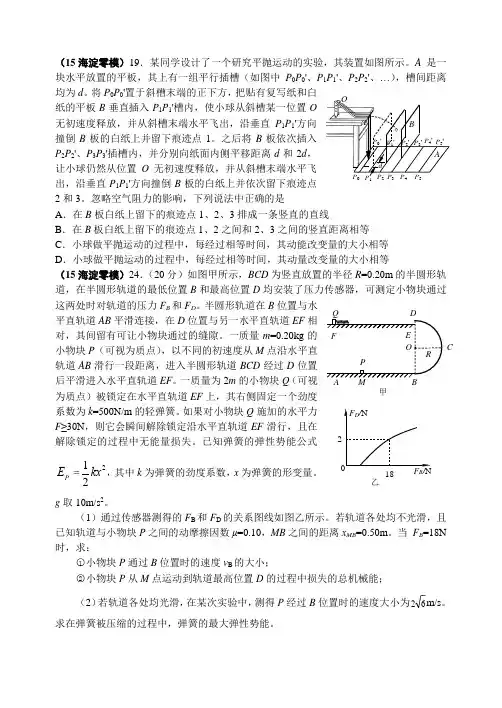
(15海淀零模)19.某同学设计了一个研究平抛运动的实验,其装置如图所示。
A 是一块水平放置的平板,其上有一组平行插槽(如图中P 0P 0'、P 1P 1'、P 2P 2'、…),槽间距离均为d 。
将P 0P 0'置于斜槽末端的正下方,把贴有复写纸和白纸的平板B 垂直插入P 1P 1'槽内,使小球从斜槽某一位置O无初速度释放,并从斜槽末端水平飞出,沿垂直P 1P 1'方向撞倒B 板的白纸上并留下痕迹点1。
之后将B 板依次插入P 2P 2'、P 3P 3'插槽内,并分别向纸面内侧平移距离d 和2d ,让小球仍然从位置O 无初速度释放,并从斜槽末端水平飞出,沿垂直P 1P 1'方向撞倒B 板的白纸上并依次留下痕迹点2和3。
忽略空气阻力的影响,下列说法中正确的是A .在B 板白纸上留下的痕迹点1、2、3排成一条竖直的直线B .在B 板白纸上留下的痕迹点1、2之间和2、3之间的竖直距离相等C .小球做平抛运动的过程中,每经过相等时间,其动能改变量的大小相等D .小球做平抛运动的过程中,每经过相等时间,其动量改变量的大小相等(15海淀零模)24.(20分)如图甲所示,BCD 为竖直放置的半径R =0.20m 的半圆形轨道,在半圆形轨道的最低位置B 和最高位置D 均安装了压力传感器,可测定小物块通过这两处时对轨道的压力F B 和F D 。
半圆形轨道在B 位置与水平直轨道AB 平滑连接,在D 位置与另一水平直轨道EF 相对,其间留有可让小物块通过的缝隙。
一质量m =0.20kg 的小物块P (可视为质点),以不同的初速度从M 点沿水平直轨道AB 滑行一段距离,进入半圆形轨道BCD 经过D 位置后平滑进入水平直轨道EF 。
一质量为2m 的小物块Q (可视为质点)被锁定在水平直轨道EF 上,其右侧固定一个劲度系数为k =500N/m 的轻弹簧。
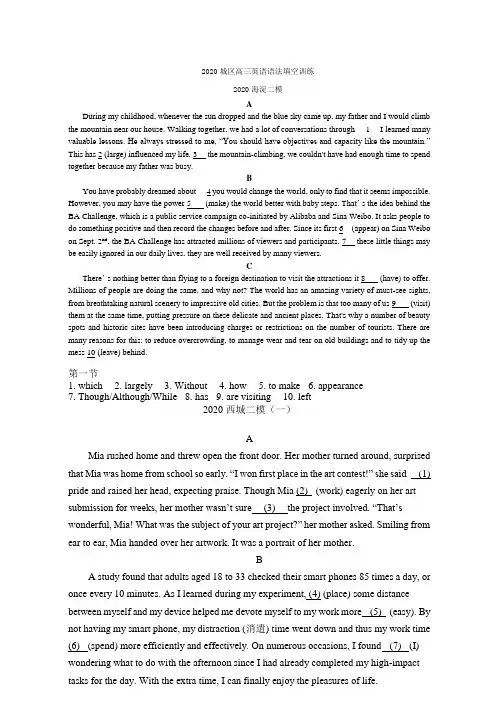
2020城区高三英语语法填空训练2020海淀二模ADuring my childhood, whenever the sun dropped and the blue sky came up, my father and I would climb the mountain near our house. Walking together, we had a lot of conversations through __1__ I learned many valuable lessons. He always stressed to me, “You should have objectives and capacity like the mountain.”This has 2 (large) influenced my life. 3__ the mountain-climbing, we couldn't have had enough time to spend together because my father was busy.BYou have probably dreamed about __4 you would change the world, only to find that it seems impossible. However, you may have the power 5___ (make) the world better with baby steps. That’ s the idea behind the BA Challenge, which is a public service campaign co-initiated by Alibaba and Sina Weibo. It asks people to do something positive and then record the changes before and after. Since its first 6__(appear) on Sina Weibo on Sept. 2nd, the BA Challenge has attracted millions of viewers and participants. 7__ these little things may be easily ignored in our daily lives, they are well received by many viewers.CThere’ s nothing better than flying to a foreign destination to visit the attractions it 8___ (have) to offer. Millions of people are doing the same, and why not? The world has an amazing variety of must-see sights, from breathtaking natural scenery to impressive old cities. But the problem is that too many of us 9___ (visit) them at the same time, putting pressure on these delicate and ancient places. That's why a number of beauty spots and historic sites have been introducing charges or restrictions on the number of tourists. There are many reasons for this: to reduce overcrowding, to manage wear and tear on old buildings and to tidy up the mess 10 (leave) behind.第一节1. which2. largely3. Without4. how5. to make6. appearance7. Though/Although/While 8. has 9. are visiting 10. left2020西城二模(一)AMia rushed home and threw open the front door. Her mother turned around, surprised that Mia was home from school so early. “I won first place in the art contest!” she said (1) pride and raised her head, expecting praise. Though Mia (2) (work) eagerly on her art submission for weeks, her mother wasn’t sure(3) the project involved. “That’s wonderful, Mia! What was the subject of your art project?” her mother asked. Smiling from ear to ear, Mia handed over her artwork. It was a portrait of her mother.BA study found that adults aged 18 to 33 checked their smart phones 85 times a day, or once every 10 minutes. As I learned during my experiment, (4) (place) some distance between myself and my device helped me devote myself to my work more (5) (easy). By not having my smart phone, my distraction (消遣) time went down and thus my work time (6) (spend) more efficiently and effectively. On numerous occasions, I found (7) (I) wondering what to do with the afternoon since I had already completed my high-impact tasks for the day. With the extra time, I can finally enjoy the pleasures of life.CIn June 2012, China’s first manned deep-sea submersible(潜水器), Jiaolong, set a world diving record for submersibles of its kind by reaching a (8) (deep) of 7,062 meters in the Mariana Trench in the Pacific Ocean. In 2017, China successfully tested a submersible (9) (call) Shenhai Yongshi, capable of diving 4,500 meters. (10) much of Jiaolong’s equipment was imported, about 95 percent of Shenhai Yongshi and its core components were produced domestically, said Xu Qinan, the chief designer of Jiaolong.1. with2. had worked/worked3. what4. placing5. easily6. was spent7.myself8. depth9. called 10. While/Although/Though2020西城二模(二)standing at about 150cm tall. Its feathers are as white as snow, except for some black onesthe weather gets cold, it migrates to east-central China. The red-crowned crane is a symbol of long life and good luck in Chinese culture.Cin 2000. During that time, more Beidou satellites were sent into orbit (轨道),(form) the Beidou Navigation Satellite System (BDS). In late 2012, it began providingpositioning, navigation, timing and messagingworldwide. Now with two more Beidou satellitesBDS has 53 satellites in orbit.2020二模1. noticed2. to clear3. that/which4. invention5. largest6. is found/has been found7. When/As8. forming9. services 10. launched2020朝阳二模AA man called Andy set out for the Pacific Crest Trail, 1 stretches from the borders of Mexico to Canada. He decided to take a selfie(自拍) every single mile along the 4,286-kilometre journey.Andy created a time-lapse(延时的) video from his five-month hike and he was almost unrecognisable towards the end of the video—he had lost 23 kilograms.2 (sad), he never finished the journey, as he3 (trap) by a snowstorm about 418 kilometres from the end.BA US astronaut, Christina Koch, spent 328 days in space, which is a record for a female astronaut. She completed her mission, landing in a remote area of Kazakhstan.Koch concluded six space walks and she did some experiments that studied 4 people are able to live outside Earth. Her time in space allows researchers 5 (study) the effects of along-term spaceflight on the female body. NASA says the findings 6 (help) the agency during its future missions to the moon and Mars.CThe European Parliament(议会) voted for 7 (cancel) the summer time by 2021. The next step is to discuss the issue with EU countries.The current law 8 (make) EU countries move their clocks forwards on the last Sunday in March and move them backwards on the last Sunday in October.Some people say that the summer time saves energy, 9 the European commission(委员会) says that the 10 (save) are small. Also, most people in the EU want to cancel the summer time.答案:1.which 2.Sadly 3.was trapped/had been trapped 4.if/whether 5.to study 6.will help7.cancel(l)ing 8.makes 9.but 10.savings2020东城二模AAs a child growing up 1 England, James Reynolds was always excited by thunderstorms. Now, he runs straight towards them as a “storm chaser”. Specialising in hurricanes and volcanoes, Reynolds travels the world to shoot pictures of Earth’s most extreme weather events. The pictures are used by TV news channels around the world. It’s a 2 (danger) job though. He has almost been hit by flying window frames twice in thepast 18 3 (month). However, he says the chase is always worth it for the places he has been to and the brilliant people he has met along the way.BAmateur explorers have found what may have been the last undiscovered island on Earth. The island is round and about three quarters of a mile wide. It sits in the northern Pacific and is a place 4 it’s neither too hot nor too cold. It’s almost completely flat and rocky. The island’s only distinguishing feature is a slight hill on the eastern side. After spotting the hidden piece of land in 5 first looked like an e-map fault, the group of friends 6 (set) out in a boat to confirm what they’d found. They’re now running an online contest to name the island.CPoetry is a beautiful art form. Its power lies in the ability to transform ordinary experiences by capturing(捕捉) a moment or emotion. 7 (write) poetry is a privilege and struggle, in part because we need to create in 8 (we) a new way of observing the world, capturing microscopic moments as materials for our work. Most of our time at the desk 9 (spend) wrestling with our imagination, and we know that a successful poem arrives on the back of failure. There are moments when an idea will not translate onto paper. Yet, failure is good, because every 10 (abandon) line we painstakingly remove prepares us for the ripe poem around the corner.1. in2. dangerous3. months4. where5. what6. set7. Writing8. ourselves9. is spent 10. abandoned2020密云二模ALast week, our class was on duty for student self-management. On the first day, I was shocked to see so much leftover food thrown away by students. What a waste! Being concerned about it, my classmates and I had a heated discussion on how to solve the problem. Finally, we all 1 (agree) that the wall newspaper would be the best choice. The next day, we put our idea into reality. Towards lunch time, we put 2 a wall newspaper outside the school cafeteria, calling on students not to waste food. Many students gathered around to read and expressed their support. To my great delight, there were changes soon. In the cafeteria, I found the trays returned after lunch all empty without any leftover. Food 3 (save) and the dining hall was cleaner.BAs we know, the global water shortage is becoming increasingly severe mainly due to globalwarming, environmental pollution and the ever-increasing population. Therefore, it’s high time we did something about it. Firstly, an 4 (effect) way, I think, is to reserve water in a scientific way for future use. Secondly, new methods need to be developed to use the existing water resources, for example, 5 (turn) sea water into fresh water. Thirdly, we must stop water pollution by law. Last but not least, it’s everyone’s responsibility 6 (make) good use of water, such as recycling and saving water in our daily life. In conclusion, people around the world should be aware of the real situation of water shortage, protect the present water resources and explore potential ones scientifically.CThe Palace Museum is working to take cultural relics into people’s daily life and bring their culturalvalue into full play by selling cultural and creative products, on the theme of “Bring the Palace Museum culture home”. The creative products mostly are creative daily necessities, like stationaries, bags, decorations and so on. 7 (Base) on the treasures in the museum, the Palace Museum has developed products such as Qianli Jiangshan series and Qingming Shanghe Tu series, Palace Dolls, folding fans, 8 are very popular with young people. The Palace Museum now 9 (change) the traditional way of communication, learns to use a variety of ways to publicize excellent traditional culture, and lets the Palace Museum cultural heritage resources live. The culture creative products are definitely brilliant choices for 10 (gift) that bear unique royal features.1. agreed2. up3. was saved4. effective5. turning6. to make7. Based8. which9. changes 10. gifts2020昌平二模AHuman beings love the world of nature that surrounds 1___ (we), and we enjoy seeing the wild world up close. When people wish to interact with a wild creature, an easy method is to attract it with some food. However, feeding wild animals is dangerous and unwise. The first problem is that animals are not meant to eat the same foods as people do. Many cheap human snacks, like fries and bread, are just not good for animals. Also, animals 2___ are fed by humans will lose their fear of p eople.it’s also possible that they couldThis makes them easy targets for hunters, 3someday attack people.BBob 4 (sort) through some of his old stuff. During the process, he c ameacross a box full of old toys and journals, as well as some old photos from his childhood. Holding one of the photos, Bob started to look back upon the very day this photo 5 (take) 30 years ago, and he got really emotional. It was the day he first learned how to ride a bike. In the park, his father patiently pushed his bike from behind as Bob had trouble riding on his own. Bob kept falling from the bike, but his father was always there, 6 (encourage) him. Eventually, he got the hang of it. Bob thought it was the best day of his life at the time.CRecycling paper is a great way to help the environment, but reusing things ___7 (make) from paper is even better. Take a copy of magazine, for example. Once you8(finish) reading it, don’t put it in your recycling bin. Instead, consider sharing it9people who haven’t read it, or giving it to your school library so that your classmates can take a look. Alternatively, you could find a completely 10(differ) use for the ma gazine’s pages. Some readers have used them to wrap gifts for their friends and family, picking pages with colourful pictures to make the presents look bright.1. us2. that/which3. and4. was sorting5. was taken6. encouraging7. made 8. finish/have finished 9. with 10. different2020顺义二模AAlexander Fleming was born __1__ August 6, 1881, on a farm near Darvel, Scotland. When he was twenty, Fleming took an entrance examination for medical school, and scored the highest of all candidates in the UK. Offered his choices of schools, Fleming chose the one at St Mary's Hospital in London. In the fall of 1928, the penicillin 2__________( discover) by Fleming, 3.__________ received the Nobel Prize for medicine in 1945 because the penicillin saved lives of thousands of the wounded soldiers during World War II.BOne day, I got stuck in the subway. It was about nine o'clock in the morning. The train was leaving a station when it started to slow down and then came to a stop. After five minutes of waiting, some passengers weren't 4____ (patience) any more. After twenty minutes, most of them were looking annoyed. Half an hour passed, I was still trapped there, 5___( wonder) if I was going to stay there for the rest of the day. But just then the train began to move 6__________( slow). A cheerwent up, and people continued to talk excitedly as if nothing had happened at all.CTime spent in a bookshop can be most enjoyable, whether you are a book-lover or merely there to buy a book as a present. You may even have entered the shop just 7__________ (find) shelter from a sudden shower. Whatever the reason, once you come inside, in most cases you may find 8__________ difficult to step outside. The desire to pick up a book with an attractive cover is irresistible (难以抗拒的). You soon become absorbed in 9__________ you read, and usually you will suddenly realize you 10 __________(stay)there for much time since you came in and must dash off to keep some forgotten appointment—without buying a book, of course.1. on2. was discovered3. who4. patient5. wondering6. slowly7. to find8. it9. what 10. have stayed2020丰台二模AEsias Bedingar always knew he wanted to study medicine. After 1 (decide) to experience a new culture, he came from Africa to the USA. There was one challenge: He 2 (speak) no English. But within just four months, he completed the ESL program. Three years later, he finished his undergraduate degree and was accepted to Harvard University, where he is pursuing a master’s degree in public health. He said it was 3 (he) dream that got him to Harvard.BConfucius (孔子), born in the district of Zou, near today’s Qufu city inS h an d on g p r o vin ce,wa s a n e du ca to r an d p h ilo s o ph e r(哲学家) 4 founded Confucianism, a school of thought that deeply influenced later generations. He was the first Chinese to set up private schools and enroll students from all walks of life. Confucius 5 (regard) as a symbol of China’straditional culture. Nowadays, Qufu holds memorial events every year 6 (honor) him and popularize his theory to the younger generations.CEverything happens for a reason. Nothing happens by chance or by means of good luck. Injury, 7 (ill), love, and lost moments of true greatness all occur to test the limits of your soul. 8 these small tests, life would be like a straight flat road to nowhere. It would be safe and comfortable, 9 dull and completely pointless. The success and downfall you experience helps to create whoyou are and decide 10 you go.1. deciding2. spoke3. his4. who/that5. is regarded/ has been regarded6. to honor7. illness8. Without 9. but/ yet 10. where2020房山二模AMa was born into a doctor’s family in 1933 and became a military doctor in 1947.She (apply) to become a paratrooper in 1961, but her first application failed because there were no female paratroopers at that time. But she learnt to parachute by training hard in secret. Finally, she became China’s first female paratrooper. She set a national recordas the oldest enlisted woman to do a parachute jump the age of 51. She completed over 140 parachuting jumps over a period of 20 years. In 2018, Ma donated her entire life savings to her home town. This (donate) was to support local education and public welfare.BShadow plays, the earliest of 4 started over 2000 years ago, have enjoyed a long history in China and consist of many styles. One famous branch displayed in museum is called Taian Shadow Play. It is believed that it originated in the Song Dynasty when an emperor came to Mount Tai to offer sacrifice. In the past, the authentic shadow figures 5 (make) of donkey skin. But nowadays,to save the 6 (life) of many donkeys, they have found some man-made materials, which are used for the figures in the hands-on area.CThe oceans are a valuable source of natural resources. Some of them are (complete)new to us. Most notable of these is China’s discovery of an ice-likesubstance,underwater vessels, such as the Jiaolong and ShenhaiYongshi, have been exploring waters at depths of thousands of metres. The Jiaolong even holds the record for the deepest dive by amanned submarine, at 7,062 metres,top ocean explorers. The research conducted by these vessels is providing scientists with abetter understanding offor deep-sea drilling, taking deep-sea exploration into a whole new era.1. applied2. at3.donation4. which5.were made6. lives7. completely8. known9.giving 10. how。
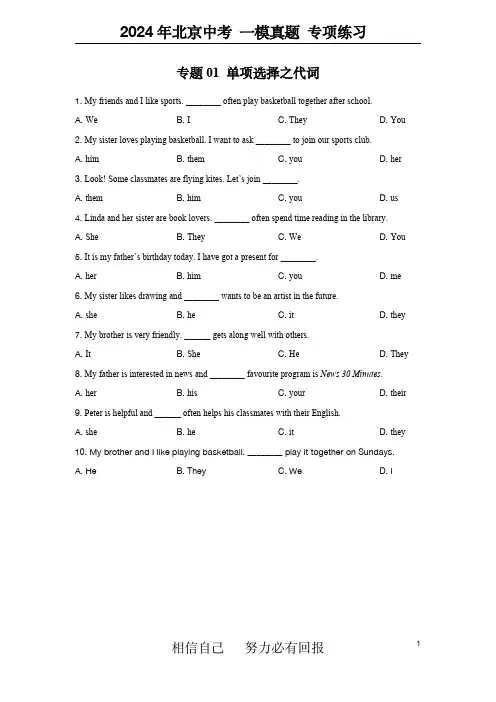
专题01单项选择之代词1.My friends and I like sports.________often play basketball together after school.A.WeB.IC.TheyD.You2.My sister loves playing basketball.I want to ask________to join our sports club.A.himB.themC.youD.her3.Look!Some classmates are flying kites.Let’s join________.A.themB.himC.you4.Linda and her sister are book lovers.________often spend time reading in the library.A.SheB.TheyC.WeD.You5.It is my father’s birthday today.I have got a present for________.A.herB.himC.youD.me6.My sister likes drawing and________wants to be an artist in the future.A.sheB.heC.itD.they7.My brother is very friendly.______gets along well with others.A.ItB.SheC.HeD.They8.My father is interested in news and________favourite program is News30Minutes.A.herB.hisC.yourD.their9.Peter is helpful and______often helps his classmates with their English.A.sheB.heC.itD.they10.My brother and I like playing basketball.________play it together on Sundays.A.HeB.TheyC.WeD.I答案解析:专题01单项选择之名词1.My friends and I like sports.________often play basketball together after school.A.WeB.IC.TheyD.You 【答案】A句意:我和我朋友都喜欢运动。
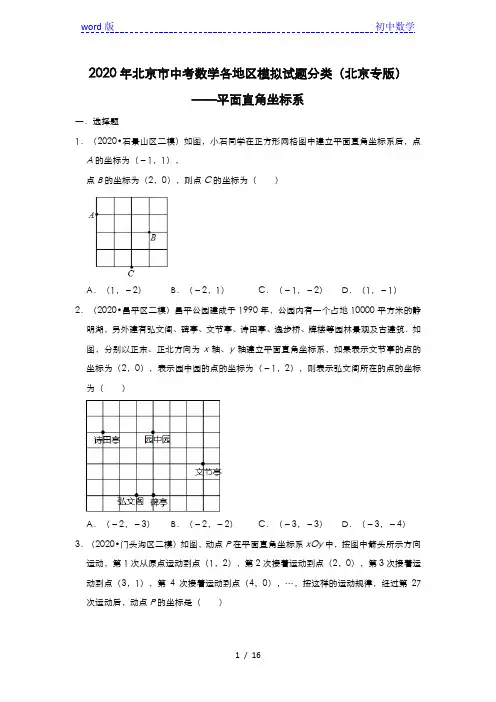
2020年北京市中考数学各地区模拟试题分类(北京专版)——平面直角坐标系一.选择题1.(2020•石景山区二模)如图,小石同学在正方形网格图中建立平面直角坐标系后,点A的坐标为(﹣1,1),点B的坐标为(2,0),则点C的坐标为()A.(1,﹣2)B.(﹣2,1)C.(﹣1,﹣2)D.(1,﹣1)2.(2020•昌平区二模)昌平公园建成于1990年,公园内有一个占地10000平方米的静明湖,另外建有弘文阁、碑亭、文节亭、诗田亭、逸步桥、牌楼等园林景观及古建筑.如图,分别以正东、正北方向为x轴、y轴建立平面直角坐标系,如果表示文节亭的点的坐标为(2,0),表示园中园的点的坐标为(﹣1,2),则表示弘文阁所在的点的坐标为()A.(﹣2,﹣3)B.(﹣2,﹣2)C.(﹣3,﹣3)D.(﹣3,﹣4)3.(2020•门头沟区二模)如图,动点P在平面直角坐标系xOy中,按图中箭头所示方向运动,第1次从原点运动到点(1,2),第2次接着运动到点(2,0),第3次接着运动到点(3,1),第4次接着运动到点(4,0),…,按这样的运动规律,经过第27次运动后,动点P的坐标是()A.(26,0)B.(26,1)C.(27,1)D.(27,2)4.(2020•顺义区二模)如图,平面直角坐标系xOy中,有A、B、C、D四点.若有一直线l经过点(﹣1,3)且与y轴垂直,则l也会经过的点是()A.点A B.点B C.点C D.点D 5.(2020•海淀区校级模拟)甲、乙、丙、丁四名工人一天中生产零件的情况如图所示,每个点的横、纵坐标分别表示该工人一天中生产I型、Ⅱ型零件数,则四名工人中日生产零件总数最大的是()A.甲B.乙C.丙D.丁6.(2020•黄州区校级模拟)如图,动点P在平面直角坐标系中,按图中箭头所示方向运动:第1次从原点运动到点(1,1),第2次接看运动到点(2,0),第3次接着运动到点(3,2),这样的运动规律经过第2019次运动后,动点P的坐标是()A.(2018,2)B.(2019,2)C.(2019,1)D.(2017,1)7.(2020•昌平区模拟)如图,昌平十三陵中的部分皇陵在地图上的位置,若庆陵的位置坐标(﹣1,4),长陵的位置坐标(2,0),则定陵的位置坐标为()A.(5,2)B.(﹣5,2)C.(2,5)D.(﹣5,﹣2)8.(2020•丰台区模拟)为了保障艺术节表演的整体效果,某校在操场中标记了几个关键位置,如图是利用平面直角坐标系画出的关键位置分布图,若这个坐标系分别以正东、正北方向为x轴、y轴的正方向,表示点A的坐标为(1,﹣1),表示点B的坐标为(3,2),则表示其他位置的点的坐标正确的是()A.C(﹣1,0)B.D(﹣3,1)C.E(﹣2,﹣5)D.F(5,2)9.(2020•丰台区模拟)为了迅速算出学生的学期总评成绩,一位同学创造了一张奇妙的算图.如图,y轴上动点M的纵坐标y m表示学生的期中考试成绩,直线x=10上动点N 的纵坐标y n表示学生的期末考试成绩,线段MN与直线x=6的交点为P,则点P的纵坐标y p就是这名学生的学期总评成绩.有下面几种说法:①若某学生的期中考试成绩为70分,期末考试成绩为80分,则他的学期总评成绩为75分;②甲同学的期中考试成绩比乙同学高10分,但期末考试成绩比乙同学低10分,那么甲的学期总评成绩比乙同学低;③期中成绩占学期总评成绩的60%.结合这张算图进行判断,其中正确的说法是()A.①③B.②③C.②D.③10.(2020•运城模拟)如图,已知棋子“车”的坐标为(﹣2,﹣1),棋子“马”的坐标为(1,﹣1),则棋子“炮”的坐标为()A.(3,2)B.(﹣3,2)C.(3,﹣2)D.(﹣3,﹣2)11.(2019•通州区三模)如图是2019北京世园会的部分场馆展示区的分布示意图.当表示国际馆A馆的点的坐标为(325,0),表示九州花境的点的坐标为(﹣65,460)时,则建立的平面直角坐标系,x轴最有可能的位置是()A.表示中国馆和世艺花舞的两点所在的直线B.表示中国馆和中华园艺展示区的两点所在的直线C.表示中国馆和九州花境的两点所在的直线D.表示百松云屏和中华园艺展示区的两点所在的直线12.(2019•北京一模)如图是北京市地铁部分线路示意图.若分别以正东、正北方向为x 轴,y轴的正方向建立平面直角坐标系,表示西单的点的坐标为(﹣4,0),表示雍和宫的点的坐标为(4,6),则表示南锣鼓巷的点的坐标是()A.(5,0)B.(5,3)C.(1,3)D.(﹣3,3)13.(2019•密云区模拟)如图是北京地铁部分线路图.若车公庄坐标为(﹣3,3),崇文门站坐标为(8,﹣2),则雍和宫站的坐标为()A.(8,6)B.(6,8)C.(﹣6,﹣8)D.(﹣8,﹣6)14.(2019•房山区一模)如图是利用平面直角坐标系画出的故宫博物院的主要建筑分布图,分别以正东、正北方向为x轴、y轴的正方向建立平面直角坐标系,有如下四个结论:①当表示保和殿的点的坐标为(0,0),表示养心殿的点的坐标为(﹣2,2)时,表示景仁宫的点的坐标为(2,3);②当表示保和殿的点的坐标为(0,0),表示养心殿的点的坐标为(﹣1,1)时,表示景仁宫的点的坐标为(1,1.5);③当表示保和殿的点的坐标为(1,﹣1),表示养心殿的点的坐标为(0,0)时,表示景仁宫的点的坐标为(2,0.5);④当表示保和殿的点的坐标为(0,1),表示养心殿的点的坐标为(﹣1,2)时,表示景仁宫的点的坐标为(1,3).上述结论中,所有正确结论的序号是()A.①②③B.②③④C.①④D.①②③④二.填空题15.(2020•门头沟区一模)如图,直线l1⊥l2,在某平面直角坐标系中,x轴∥11,y轴∥l2,点A的坐标为(﹣1,2),点B的坐标为(2,﹣1),那么点C在第象限.16.(2020•西城区校级模拟)在平面直角坐标系中,已知点A(2﹣a,2a+3)在第四象限.若点A在两坐标轴夹角平分线上,则a的值为.17.(2020•房山区二模)如图,若在象棋棋盘上建立直角坐标系,使“帅”位于点(﹣3,﹣2),“炮”位于点(﹣2,0),则“兵”位于的点的坐标为.18.(2020•海淀区校级一模)在平面直角坐标系中,点A的坐标为(﹣3,2).若线段AB∥x轴,且AB的长为4,则点B的坐标为.19.(2019•朝阳区校级一模)在平面直角坐标系xOy中,我们把横、纵坐标都是整数的点叫做整点.已知点A(0,4),点B是x轴正半轴上的点,记△AOB内部(不包括边界)的整点个数为m.当m=6时,点B的横坐标a的取值范围是.20.(2019•门头沟区二模)如图是利用平面直角坐标系画出的老北京一些地点的分布示意图,这个坐标系分别以正东和正北方向为x轴和y轴的正方向,如果表示右安门的点的坐标为(﹣2,﹣3),表示朝阳门的点的坐标为(3,2),那么表示西便门的点的坐标为.21.(2019•平谷区二模)2019年4月29日中国北京世界园艺博览会在北京延庆开幕,大会以“绿色生活,美丽家园”为主题.如图,是北京世界园艺博览会部分导游图,若国际馆的坐标为(4,2),植物馆的坐标为(﹣4,﹣1),则中国馆的坐标为.22.(2019•海淀区一模)如图是玉渊潭公园部分景点的分布示意图,在图中,分别以正东、正北方向为x轴、y轴的正方向建立平面直角坐标系,当表示西桥的点的坐标为(﹣6,1),表示中堤桥的点的坐标为(1,2)时,表示留春园的点的坐标为.23.(2019•怀柔区模拟)如图,若在象棋盘上建立平面直角坐标系xOy,使“帅”的坐标为(﹣1,﹣2),“马”的坐标为(2,﹣2),则“兵”的坐标为.参考答案一.选择题1.解:如图所示:点C的坐标为(1,﹣2).故选:A.2.解:如图所示:弘文阁所在的点的坐标为:(﹣2,﹣2).故选:B.3.解:观察图象,结合动点P第1次、第2次、第3次、第4次(1,2),(2,0),(3,1),(4,0)运动后的点的坐标特点,可知各点的横坐标与运动次数相同,则经过第27次运动后,动点P的横坐标是27,故排除选项A和B;由图象可得纵坐标每4次运动组成一个循环:2,0,1,0;∵27÷4=6…3,∴经过第27次运动后,动点P的纵坐标是1,故经过第27次运动后,动点P的坐标是(27,1).故选:C.4.解:如图所示:有一直线L通过点(﹣1,3)且与y轴垂直,因为点D(0,3),故L也会通过D点.故选:D.5.解:四名个人中,丙的横、纵坐标的和最大,即日生产零件总数最大,故选:C.6.解:根据动点P在平面直角坐标系中按图中箭头所示方向运动,第1次从原点运动到点(1,1),第2次接着运动到点(2,0),第3次接着运动到点(3,2),则第4次运动到点(4,0),第5次接着运动到点(5,1),…,则横坐标为运动次数,经过第2019次运动后,动点P的横坐标为2019,纵坐标为1,0,2,0,每4次一轮,则经过第2019次运动后,动点P的纵坐标为:2019÷4=4×504+3,故纵坐标为四个数中第3个数为2,则经过第2019次运动后,动点P的坐标是:(2019,2).故选:B.7.解:根据庆陵的位置坐标(﹣1,4),长陵的位置坐标(2,0),建立直角坐标系,如图所以定陵的位置坐标为(﹣5,﹣2),故选:D.8.解:根据点A的坐标为(1,﹣1),表示点B的坐标为(3,2),可得:C(0,0),D(﹣3,1),E(﹣5,﹣2),F(5,﹣2),故选:B.9.解:如图所示:①中,与x=6的交点大于75,故错误②中,乙与x=6的交点大于甲与x=6的交点,所以期末总评成绩乙大于甲,正确③中,由图象可知,期末总评成绩占60%,故错误故选:C.10.解:如图,棋子“炮”的坐标为(3,﹣2).故选:C.11.解:∵表示国际馆A馆的点的坐标为(325,0),∴表示国际馆A馆的点位于x轴.又表示九州花境的点的坐标为(﹣65,460),∴x轴在九州花境的下面,观察选项,只有选项D符合题意.故选:D.12.解:根据题意可建立如下所示平面直角坐标系,则表示南锣鼓巷的点的坐标是(1,3),故选:C.13.解:由题意可建立如图所示平面直角坐标系,则雍和宫站的坐标为(8,6),故选:A.14.解:①当表示保和殿的点的坐标为(0,0),表示养心殿的点的坐标为(﹣2,2)时,表示景仁宫的点的坐标为(2,3),正确;②当表示保和殿的点的坐标为(0,0),表示养心殿的点的坐标为(﹣1,1)时,表示景仁宫的点的坐标为(1,1.5),正确;③当表示保和殿的点的坐标为(1,﹣1),表示养心殿的点的坐标为(0,0)时,表示景仁宫的点的坐标为(2,0.5),正确;④当表示保和殿的点的坐标为(0,1),表示养心殿的点的坐标为(﹣1,2)时,表示景仁宫的点的坐标为(1,2.5),此结论错误.故选:A.二.填空题(共9小题)15.解:如图,∵点A的坐标为(﹣1,2),点B的坐标为(2,﹣1),∴点A位于第二象限,点B位于第四象限,∴点C位于第三象限.故答案是:三.16.解:∵点A(2﹣a,2a+3)在第四象限,点A在两坐标轴夹角平分线上,∴2﹣a+2a+3=0,解得:a=﹣5.故答案为:﹣5.17.解:如图所示:“兵”位于的点的坐标为:(﹣5,1).故答案为:(﹣5,1)18.解:∵点A的坐标为(﹣3,2),线段AB∥x轴,∴点B的纵坐标为2,若点B在点A的左边,则点A的横坐标为﹣3﹣4=﹣7,若点B在点A的右边,则点A的横坐标为﹣3+4=1,∴点B的坐标为(﹣7,2)或(1,2).故答案为:(﹣7,2)或(1,2).19.解:如图所示:当△AOB内部(不包括边界)的整点个数为m,当m=6,点B的横坐标a的取值范围是:4<a<.故答案为:4<a<.20.解:根据右安门的点的坐标为(﹣2,﹣3),可以确定直角坐标系中原点在正阳门,∴西便门的坐标为(﹣3,1),故答案为(﹣3,1);21.解:如图所示:中国馆的坐标为:(0,0),故答案为:(0,0).22.解:根据题意可建立如下所示平面直角坐标系,则表示留春园的点的坐标为(9,﹣1),故答案为(9,﹣1).23.解:如图所示:“兵”的坐标为:(﹣3,1).故答案为:(﹣3,1).。
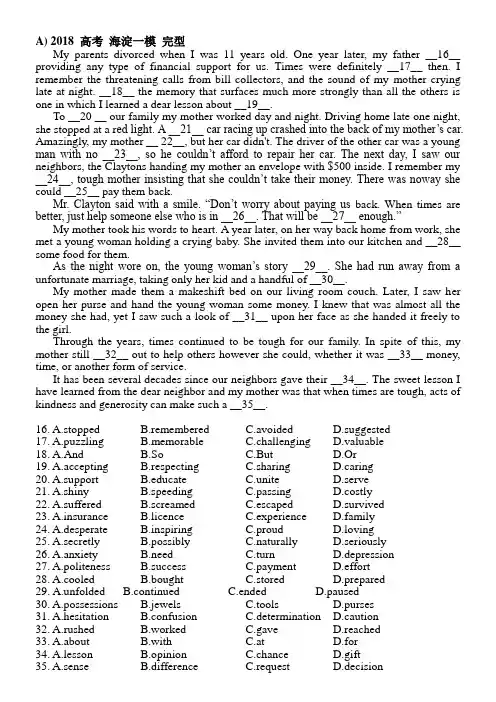
A)2018 高考海淀一模完型My parents divorced when I was 11 years old. One year later, my father __16__ providing any type of financial support for us. Times were definitely __17__ then. I remember the threatening calls from bill collectors, and the sound of my mother crying late at night. __18__ the memory that surfaces much more strongly than all the others is one in which I learned a dear lesson about __19__.To __20 __ our family my mother worked day and night. Driving home late one night, she stopped at a r ed light. A __21__ car racing up crashed into the back of my mother’s car. Amazingly, my mother __ 22__, but her car didn't. The driver of the other car was a young man with no __23__, so he couldn’t afford to repair her car. The next day, I saw our neighbors, the Claytons handing my mother an envelope with $500 inside. I remember my __24__, tough mother insisting that she couldn’t take their money. There was noway she could __25__ pay them back.Mr. Clayton said with a smile. “Don’t worry about paying us back. When times are better, just help someone else who is in __26__. That will be __27__ enough.”My mother took his words to heart. A year later, on her way back home from work, she met a young woman holding a crying baby. She invited them into our kitchen and __28__ some food for them.As the night wore on, the young woman’s story __29__. She had run away from a unfortunate marriage, taking only her kid and a handful of __30__.My mother made them a makeshift bed on our living room couch. Later, I saw her open her purse and hand the young woman some money. I knew that was almost all the money she had, yet I saw such a look of __31__ upon her face as she handed it freely to the girl.Through the years, times continued to be tough for our family. In spite of this, my mother still __32__ out to help others however she could, whether it was __33__ money, time, or another form of service.It has been several decades since our neighbors gave their __34__. The sweet lesson I have learned from the dear neighbor and my mother was that when times are tough, acts of kindness and generosity can make such a __35__.16. A.stopped B.remembered C.avoided D.suggested17. A.puzzling B.memorable C.challenging D.valuable18. A.And B.So C.But D.Or19. A.accepting B.respecting C.sharing D.caring20. A.support cate C.unite D.serve21. A.shiny B.speeding C.passing D.costly22. A.suffered B.screamed C.escaped D.survived23. A.insurance B.licence C.experience D.family24. A.desperate B.inspiring C.proud D.loving25. A.secretly B.possibly C.naturally D.seriously26. A.anxiety B.need C.turn D.depression27. A.politeness B.success C.payment D.effort28. A.cooled B.bought C.stored D.prepared29. A.unfolded B.continued C.ended D.paused30. A.possessions B.jewels C.tools D.purses31. A.hesitation B.confusion C.determination D.caution32. A.rushed B.worked C.gave D.reached33. A.about B.with C.at D.for34. A.lesson B.opinion C.chance D.gift35. A.sense B.difference C.request D.decisionB) 2018 高考东城一模完型My brother Gene was four years older than me. By the time I turned four, I was upset that he could read but I couldn’t. I burned with __16__ to read a book like my brother. I begged, “Teach me to read, Mom! Please, please?!” finally,Mom set aside time after lunch __17__ reading lessons, and soon after my fifth birthday, I was reading.I longed for my father, who was a great storyteller, to read me the b ooks that I couldn’t yet read on my own. But my father worked three jobs to feed the family. He didn’t have the time or __18__ in the evening to read to me. __19__, every Sunday morning, my brother and I lay next to him in bed, waiting for him to tell stories about his __20__. I can still hear my father’s voice __21__ the cold winters on the family farm in Poland. His family didn’t have enough money to burn wood in the fireplace all night. He told us that he always volunteered to help with __22__. I can smell the soup made by my grandma and __23__ my father cutting onions, carrots and tomatoes for salad, and when no one was looking, putting a piece into his mouth. “I always __24__,” he explained. Hearing my father’s stories __25__ me closer to the books and the stories they held.One Saturday afternoon when I was seven, we walked two blocks to the small __26__ in our neighborhood, and my dad filled out forms for a card. That Saturday __27__ my life: I met Mrs. Schwartz, the librarian, and my dad said, “You’r e __28__ enough to walk to the library yourself.” And so I did --- almost every afternoon.In my mind, Mrs. Schwartz was “the keeper of books and the guardian of stories”. Some days she read aloud to a small group of us __29__. Most of time, Mrs. Schwartz let me __30__ myself with books I pulled from the shelves and look through them to see which ones I’d __31__ out. I remember that sometimes she’d __32__ a book and tell me a part of the story. But she always let me choose. Books became my __33__ who were my comfort when I felt lonely.Yes, reading changed me. It gave me the __34__ to study hard so I could become a teacher, and share my __35__ of reading with my students. And inside my head, I can still hear the voices of my mother, father, and Mrs. Schwartz, which are with me every time I open the first page of a new book.16. A.anger B.worry C.desire D.interest17. A.for B.before C.in D.until18. A.ability B.ambition C.courage D.energy19. A.Still B.Then C.Therefore D.Finally20. A.workplace B.childhood C.farmland D.neighborhood21. A.explaining B.describing C.introducing D.interpreting22. A.living B.reading C.farming D.cooking23. A.catch B.discover C.notice D.picture24. A.busy B.poor C.hungry D.tired25. id B.drew C.taught D.left26. A.library B.bookstore C.office D.club27. A.saved B.changed C.tested D.controlled28. A.near B.ready C.old D.free29. A.graduates B.regulars C.candidates municators30. A.surround B.familiarize C.examine D.reward31. A.find B.lend C.check D.sign32. A.write B.recommend C.study D.reserve33. A.teachers B.assistants C.listeners panions34. A.drive B.dream C.order D.chance35. A.lesson B.time C.love D.planC) 2018 高考西城一模完型Emerald(翡翠) Dreams“And this is me kissing the Blarney Stone”, says Carrie, my seventeen-year-old daughter. She turns the pages of her new photo album, recounting her recent ten-day __16__ abroad, and my mind wanders back...way back to when she was only five.“Someday I’m going to Ireland”, she said, holding her Childcraft book in her lap. Her blue eyes __17__ as she looked at the beautiful pictures. “Well, maybe you can!” I said. However, it was __18__ for our family to pay for the luxury of traveling. I was working as a secretary. My husband Charlie had to close his __19__ last year due to his poor health...Ten years later, Carrie came home from school one day, hardly able to contain her __20__, “Mama, you’ll never __21__ where the class is going. To Ireland!” she smiled __22__. “You’re kidding!” I said. “Ireland! Where you’ve always wanted to go!”“The trip is __23__ for year after next, and the $2,100 can be paid in installments(分期付款).” Then she added, “But that’s too much... Isn’t it?” Her voice was __24__ yet doubting. “Well,” I said slowly, “Daddy and I can’t help much; __25__, you have two years to earn the money.” “You think so?” Carrie’s face lit up like a Christmas tree. “Well,”I __26__, “maybe you could use your father’s bakery and sell baked goods.” Sell baked goods? We __27__ at each other. Carrie was an excellent __28__! This would work!So the plan was __29__. Carrie began working, making a variety of baked goods. She used dried apples, cooked, seasoned and spiced to perfection. Soon, however, fried apple-pies became the customer favorite. All ingredients were __30__ --- real shortening (起酥油), real butter --- and the crust(皮) was handmade and hand-rolled. Finally the pies were fried to a beautiful, golden brown! The finished product was an extremely pleasant treat, winning __31__ from even the little old ladies in these hills who have been making dried-apple pies for decades. __32__ began rolling in, and the Ireland fund grew, and well __33__ the given time the trip abroad was paid in full...Now I’m looking at her album as she proudly points out the __34__ she visited: castles of Ireland, historic bridges and churches, cobblestone(鹅卵石) streets of Dublin... so much like those in her Childcraft book. My daughter will forever remember this dream come true, a dream that began in the heart of a five-year-old girl and was completely made __35__ by the delicious apple pie!16. A.training B.journey C.study D.work17. A.brightened B.darkened C.hardened D.weakened18. A.wise B.wrong C.difficult D.pleasant19. A.bookstore B.bakery C.agency D.grocery20. A.disappointment B.surprise C.sorrow D.excitement21. A.realize B.understand C.guess D.forget22. A.shyly B.slightly C.bitterly D.broadly23. A.delayed B.planned C.continued D.made24. A.sharp B.hesitant C.hopeful D.firm25. A.thus B.even C.also D.still26. A.suggested B.insisted C.wondered D.disagreed27. A.pointed B.stared C.shouted ughed28. A.secretary B.traveler C.cook D.student29. A.canceled B.changed C.discussed id30. A.natural B.delicious C.clean D.soft31. A.praise B.awards C.trust D.titles32. A.Menus B.Ideas C.Orders D.Questions33. A.within B.from C.beyond D.for34. A.buildings B.sites C.cities D.countries35. A.necessary B.important C.popular D.possible。
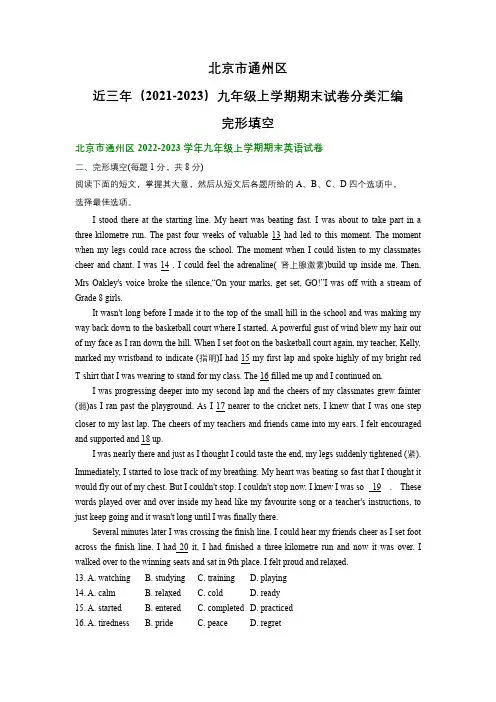
北京市通州区近三年(2021-2023)九年级上学期期末试卷分类汇编完形填空北京市通州区2022-2023学年九年级上学期期末英语试卷二、完形填空(每题1分,共8分)阅读下面的短文,掌握其大意,然后从短文后各题所给的A、B、C、D四个选项中,选择最佳选项。
I stood there at the starting line. My heart was beating fast. I was about to take part in a three-kilometre run. The past four weeks of valuable 13 had led to this moment. The moment when my legs could race across the school. The moment when I could listen to my classmates cheer and chant. I was 14 . I could feel the adrenaline( 肾上腺激素)build up inside me. Then, Mrs Oakley's voice broke the silence,“On your marks, get set, GO!”I was off with a stream of Grade 8 girls.It wasn't long before I made it to the top of the small hill in the school and was making my way back down to the basketball court where I started. A powerful gust of wind blew my hair out of my face as I ran down the hill. When I set foot on the basketball court again, my teacher, Kelly, marked my wristband to indicate (指明)I had 15 my first lap and spoke highly of my bright red T-shirt that I was wearing to stand for my class. The 16 filled me up and I continued on.I was progressing deeper into my second lap and the cheers of my classmates grew fainter (弱)as I ran past the playground. As I 17 nearer to the cricket nets, I knew that I was one step closer to my last lap. The cheers of my teachers and friends came into my ears. I felt encouraged and supported and 18 up.I was nearly there and just as I thought I could taste the end, my legs suddenly tightened (紧). Immediately, I started to lose track of my breathing. My heart was beating so fast that I thought it would fly out of my chest. But I couldn't stop. I couldn't stop now. I knew I was so 19 . These words played over and over inside my head like my favourite song or a teacher's instructions, to just keep going and it wasn't long until I was finally there.Several minutes later I was crossing the finish line. I could hear my friends cheer as I set foot across the finish line. I had 20 it, I had finished a three-kilometre run and now it was over. I walked over to the winning seats and sat in 9th place. I felt proud and relaxed.13. A. watching B. studying C. training D. playing14. A. calm B. relaxed C. cold D. ready15. A. started B. entered C. completed D. practiced16. A. tiredness B. pride C. peace D. regret17. A. drew B. walked C. mentioned D. carried18. A. woke B. stood C. speeded D. showed19. A. safe B. far C. healthy D. close20. A. made B. built C. reported D. broken北京市通州区2021-2022学年九年级上学期期末英语试卷二、完形填空(每题1分,共8分)阅读下面的短文,掌握其大意,然后从短文后各题所给的A、B、C、D四个选项中,选择最佳选项。
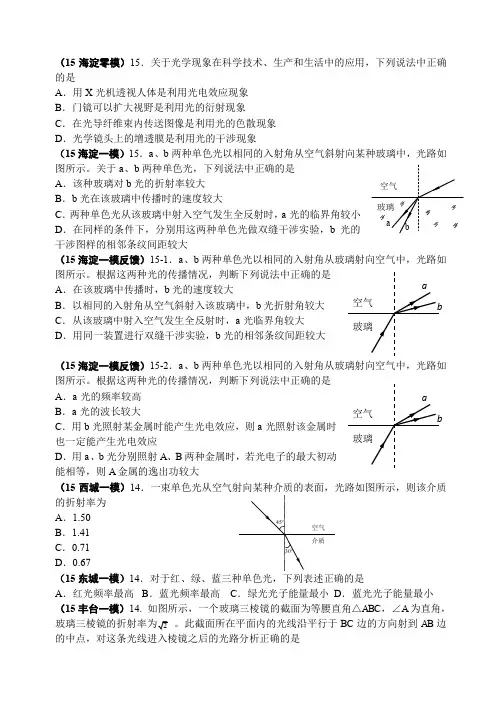
(15海淀零模)15.关于光学现象在科学技术、生产和生活中的应用,下列说法中正确的是A .用X 光机透视人体是利用光电效应现象B .门镜可以扩大视野是利用光的衍射现象C .在光导纤维束内传送图像是利用光的色散现象D .光学镜头上的增透膜是利用光的干涉现象(15海淀一模)15.a 、b 两种单色光以相同的入射角从空气斜射向某种玻璃中,光路如图所示。
关于a 、b 两种单色光,下列说法中正确的是A .该种玻璃对b 光的折射率较大B .b 光在该玻璃中传播时的速度较大C .两种单色光从该玻璃中射入空气发生全反射时,a 光的临界角较小D .在同样的条件下,分别用这两种单色光做双缝干涉实验,b 光的干涉图样的相邻条纹间距较大(15海淀一模反馈)15-1.a 、b 两种单色光以相同的入射角从玻璃射向空气中,光路如图所示。
根据这两种光的传播情况,判断下列说法中正确的是A .在该玻璃中传播时,b 光的速度较大B .以相同的入射角从空气斜射入该玻璃中,b 光折射角较大C .从该玻璃中射入空气发生全反射时,a 光临界角较大D .用同一装置进行双缝干涉实验,b 光的相邻条纹间距较大(15海淀一模反馈)15-2.a 、b 两种单色光以相同的入射角从玻璃射向空气中,光路如图所示。
根据这两种光的传播情况,判断下列说法中正确的是A .a 光的频率较高B .a 光的波长较大C .用b 光照射某金属时能产生光电效应,则a 光照射该金属时也一定能产生光电效应D .用a 、b 光分别照射A 、B 两种金属时,若光电子的最大初动能相等,则A 金属的逸出功较大(15西城一模)14.一束单色光从空气射向某种介质的表面,光路如图所示,则该介质的折射率为A .1.50B .1.41C .0.71D .0.67(15东城一模)14.对于红、绿、蓝三种单色光,下列表述正确的是A .红光频率最高B .蓝光频率最高C .绿光光子能量最小D .蓝光光子能量最小 (15丰台一模)14. 如图所示,一个玻璃三棱镜的截面为等腰直角△ABC ,∠A 为直角,。
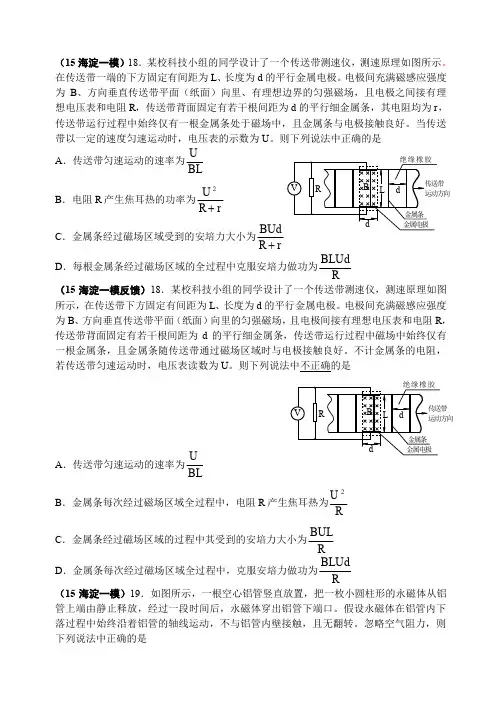
向 (15海淀一模)18.某校科技小组的同学设计了一个传送带测速仪,测速原理如图所示。
在传送带一端的下方固定有间距为L 、长度为d 的平行金属电极。
电极间充满磁感应强度为B 、方向垂直传送带平面(纸面)向里、有理想边界的匀强磁场,且电极之间接有理想电压表和电阻R ,传送带背面固定有若干根间距为d 的平行细金属条,其电阻均为r ,传送带运行过程中始终仅有一根金属条处于磁场中,且金属条与电极接触良好。
当传送带以一定的速度匀速运动时,电压表的示数为U 。
则下列说法中正确的是A .传送带匀速运动的速率为BLU B .电阻R 产生焦耳热的功率为r R U +2 C .金属条经过磁场区域受到的安培力大小为rR BUd +D .每根金属条经过磁场区域的全过程中克服安培力做功为RBLUd (15海淀一模反馈)18.某校科技小组的同学设计了一个传送带测速仪,测速原理如图所示,在传送带下方固定有间距为L 、长度为d 的平行金属电极。
电极间充满磁感应强度为B 、方向垂直传送带平面(纸面)向里的匀强磁场,且电极间接有理想电压表和电阻R ,传送带背面固定有若干根间距为d 的平行细金属条,传送带运行过程中磁场中始终仅有一根金属条,且金属条随传送带通过磁场区域时与电极接触良好。
不计金属条的电阻,若传送带匀速运动时,电压表读数为U 。
则下列说法中不正确的是A .传送带匀速运动的速率为BLU B .金属条每次经过磁场区域全过程中,电阻R 产生焦耳热为R U 2C .金属条经过磁场区域的过程中其受到的安培力大小为RBUL D .金属条每次经过磁场区域全过程中,克服安培力做功为R BLUd (15海淀一模)19.如图所示,一根空心铝管竖直放置,把一枚小圆柱形的永磁体从铝管上端由静止释放,经过一段时间后,永磁体穿出铝管下端口。
假设永磁体在铝管内下落过程中始终沿着铝管的轴线运动,不与铝管内壁接触,且无翻转。
忽略空气阻力,则下列说法中正确的是向A .若仅增强永磁体的磁性,则其穿出铝管时的速度变小B .若仅增强永磁体的磁性,则其穿过铝管的时间缩短C .若仅增强永磁体的磁性,则其穿过铝管的过程中产生的焦耳热减少D .在永磁体穿过铝管的过程中,其动能的增加量等于重力势能的减少量(15海淀一模反馈)19-1体从距离铝管上端为h 处由静止释放,经过一段时间后,永磁体穿出铝管下端口。
第 1 页 共 20 页 怀柔区 A little boy invited his mother to attend his school‟s first teacher-parent meeting. To the little boy‟s disappointment, she said she would go. This would be the 36 time that his classmates and teacher met his mother and he felt ashamed of her 37 . Although she was a beautiful woman, there was a severe scar(疤痕) that covered nearly the entire right side of her face. The boy 38 wanted to talk about why or how she got the scar. At the meeting, the people were impressed by the kindness and natural beauty of his mother in spite of the scar, but the little boy was still embarrassed and 39 himself from everyone. He did, however, get within 40 of a conversation between his mother and his teacher. The teacher asked 41 , “How did you get the scar on your face?” The mother replied, “ When my son was a baby, he was in a room that caught fire. Everyone was too 42 to go in because the fire was out of control, so I went in. As I was running toward his bed, I saw a long piece of wood coming down and I 43 myself over him to protect him. I was knocked senseless but fortunately, a fireman came in and saved 44 of us.” She touched the burned side of her face. “ This scar will last, but to this day, I have never 45 what I did.” At this point, the little boy came 46 running toward his mother with tears in his eyes. He held her in his arms and felt a great sense of the sacrifice(牺牲) that his mother had made for 47 . He held her hand tightly for the rest of the day. 36. A. second B. last C. first D. next 37. A. appearance B. personality C. hobby D. dressing 38. A. seldom B. never C. really D. always 39. A. took B. met C. decided D. hid 40. A. hearing B. seeing C. feeling D. meeting 41. naturally B. happily C. carefully D. nervously 42. A. worried B. tired C. afraid D. excited 43. A. placed B. kept C. made D. rushed 44. A. all B. none C. both D. neither 45. A. forgot B. hoped C. regretted D. remembered 46. A. to B. out C. off D. away 47.A. he B. him C. his D. himself 36 37 38 39 40 41 42 43 44 45 46 47 C A B D A C C A C C B B 第 2 页 共 20 页
昌平区 Rosa liked making up stories. She was so 36 that her classmates believed her from time to time. In fact, the whole class believe her! At first she supposed it was fun. Now, as she got up to talk 37 the class, she knew that make-believe stories had some ways of coming back to make you sad. Rosa‟s parents were separated . Nine months out of year, Rosa lived with her 38 in an apartment on Anderson Street. But when summer 39 , she went to her father‟s farm in Arizona. The farm was great! Rosa rode horses and helped with some farm work. Her father, however, was so 40 that he couldn‟t find time to go places with her. When she arrived each summer, her father would 41 her at the airport and take her out to 42 . And the day she went back to the city , he would always buy her a present. When summer came to a close, Rosa 43 to her mother. At school she44 lots of stories her friends told about their family trip. Rosa wished she had a 45 to talk about. Not long after school began, Rosa was looking through travel magazine in the school library. They talked about many exciting places, like England and Germany. When Rosa‟s friends asked what she had done that summer, she made up something that was not true. Remembering the travel magazines she had looked at, she 46 her classmates that she and her father had gone to England! When the class began studying England, Mr Thomas asked Rosa to tell all the things she could 47 about her trip to England. 36. A. afraid B. worried C. sure D. happy 37. A.of B. at C. back D. before 38. A. mother B. father C. classmates D. friends 39. A. passed B. arrived C. lasted D. changed 40. A. pleased B. lonely C. busy D. weak 41. A. show B. visit C. meet D. send 42. A. eat B. know C. talk D. spend 43. A. spoke B. returned C. said D. got 44. A. bought B. borrowed C. thought D. heard 45. A. garden B. family C. farm D. magazine 46. A. told B. looked C. gave D. talked 47. A. think B. read C. see D. remember
36-40 CDABC 41-45 CABDB 46-47 AD 第 3 页 共 20 页
朝阳区 Joe was driving home on a country road one winter evening. He spent several months looking for a new 36 since the factory he had worked in closed. It was a lonely road. Not many people had a reason to be on it 37 they were leaving. He almost didn‟t see a small car 38 at the side of the road. He thought the driver might need help, so he pulled up in front of the car and got out. An old lady was in the car. At first she was worried. “He didn‟t look 39 . He looked poor and hungry,” she thought. He could see that she was 40 . He said, “I‟m here to help you, Madam.” All the lady had was a flat tire (瘪的轮胎). While Joe was 41 , the lady opened the window and began to talk to him. She told him that she couldn‟t 42 him enough for helping her in such a situation. Soon Joe was able to change the tire. She asked how much she owed (欠) him. Joe 43 thought about money. He told her that if she really wanted to pay him back, the next time she saw someone who needed help, she could 44 that person the help. A few miles down the road, the old lady saw a small restaurant. She decided to eat something and 45 herself up before she finished her trip home. The waitress looked young and poor. After she finished her meal, she handed a 100-dollar bill to her. When the waitress went to get her change, the lady left without being 46 . The waitress then found some words on a piece of paper, “You don‟t owe me a thing. Someone once helped me, the way I‟m helping you. If you really want to pay me back, here‟s what you 47 . Don‟t let the chain (链) of love end with you.” 36. A. job B. place C. factory D. house 37. A. although B. unless C. because D. until 38. A. put B. stopped C. set D. parked 39. A. honest B. safe C. polite D. nice 40. A. excited B. surprised C. nervous D. shy 41. A. working B. thinking C. looking D. talking 42. A. pay B. love C. thank D. praise 43. A. once B. ever C. seldom D. never 44. A. send B. give C. pass D. bring 45. A. warm B. put C. cheer D. pick 46. A. watched B. known C. noticed D. heard 47. A. see B. want C. say D. do 36. A 37. B 38. D 39. B 40. C 41. A 42. C 43. D 44. B 45. A 46. C 47. D